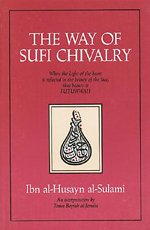This classic by Ibn Al-Husayn al-Sulami, a Sufi saint and scholar, has been used since the tenth century as code of conduct. Here many spiritual masters share their experience of futuwwah. In Arabic, fata literally means a handsome, brave youth. Following the use of the term in the Holy Koran it came to be associated with an ideal, noble person whose hospitality and generosity would enable him to always put others above oneself.
According to Sufis, futuwwah is a state of mind that is animated by selflessness, compassion, kindness, and altruism. This behavior was modeled by the Prophet Muhammad and by other friends and lovers of Allah. The word that describes the Sufi brand of chivalry is adab. They see it as "a continuous act of devotion, for it is a method of constant remembrance of God."
What are some of the marks of this code of conduct? Here are a few:
• Be satisfied with little for yourself, and wish much for others.
• Instead of seeking the faults of others, look at your own faults.
• Respond to cruelty with kindness, and do not punish for error.
• Bring joy into the lives of your friends and meet their needs.
• Prefer the well-being and comfort of your brothers over your own, and relieve them of their difficulties.
• The host should serve everything he has to his brother. Even if he has only a drop of water left, he should serve that.
And just to add a little relish, here is Abdul-Husayn ibn Sam' un on the broad meaning of futuwwah:
"[It] means opposing and arguing little, being fair; preventing errors in oneself and not criticizing the errors of others; trying to correct one's faults; accepting accusations; enduring troubles caused by others; lowering one's ego; being pleasant to both the old and the young, doing good deeds, giving good advice, and accepting advice; loving one's friends; and bearing peacefully with one's enemies."
